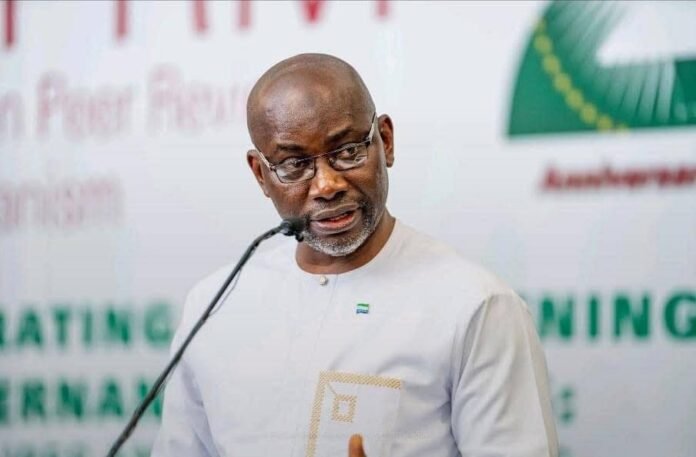By Samuel Sesay
A fresh storm is brewing inside Sierra Leone’s government after the Minister of Political and Public Administration, Amara Kallon, openly contradicted President Julius Maada Bio’s position on the management of the Peace Commission. Speaking at a press briefing organized by the Ministry of Information and Civic Education, Kallon defended the dismissal of senior officials at the Commission, calling it a reform measure. His remarks, however, have sparked debate about ministerial overreach and the erosion of presidential authority.
Kallon’s Position
Minister Kallon told reporters that he had been at the forefront of building the Peace Commission, pointing to his role in organizing the Bintumani III Conference and participating in what he described as a “functional and management review retreat.” He insisted that the dismissal of directors and other senior staff was an executive process aimed at restructuring the Commission.
“I played a leading role in Bintumani III, where we resolved to establish the Peace Commission,” Kallon said. “I also took part in a three-day management and functional review retreat. These were executive appointments, and those relieved of duty have been asked to reapply.”
His justification effectively defended the controversial removal of several appointees of President Bio, raising questions about how far a minister can go in challenging presidential authority.
Disputed Narrative
Investigations into Kallon’s statements suggest that several of his claims are inaccurate. The Peace Commission was not created out of the Bintumani III Conference, as he claimed, but rather rooted in earlier frameworks: the Lomé Peace Agreement of 1999 and the Truth and Reconciliation Commission (TRC) report.
In addition, while Kallon claimed eight directors were appointed, official records confirm that the President appointed six directors, alongside a Deputy Executive Secretary and an Executive Secretary.
Equally unclear is the so-called “management and functional review retreat” he cited. Sources inside the Commission say no such retreat has been held under their auspices, leaving questions about where Kallon’s version of events originated.
“The Minister should go back to the Act that created the Commission,” a civil society figure remarked. “History cannot be twisted for political convenience. The Peace Commission was a product of post-war reconciliation, not a recent conference.”
The Executive Secretary Controversy
Attention has also turned to Hawa Sally Samai, the current Executive Secretary of the Commission. Before her appointment, she was a consultant hired by the government to draft the Green Paper that laid the foundation for the Peace Commission. Critics argue that her transition from consultant to head of the institution represents a conflict of interest.
“When the person who drafted the framework ends up running the same body, suspicions of conflict of interest are inevitable,” one governance analyst noted. “It raises questions about transparency and whether the President was properly advised.”
Kallon did not address these concerns, fueling perceptions that some details are being deliberately downplayed.
A Test of Presidential Authority
Observers point to the broader implications of the row: ministers and senior officials increasingly appear to be acting independently of the Presidency. For many, this is not just about the Peace Commission but about whether President Bio’s authority is being openly undermined.
“We are seeing more and more instances where presidential directives are ignored or reshaped by ministers,” a senior political source told this reporter. “That is a dangerous path for governance in Sierra Leone.”
President Bio’s silence on the matter has sparked speculation about whether he tacitly approves of Kallon’s position or is reluctant to confront him publicly.
Why the Peace Commission Matters
The Peace Commission was designed to safeguard national unity and reconciliation in a country still healing from a brutal civil war. It was meant to carry forward the unfinished business of the TRC and ensure Sierra Leone never again relapses into conflict. For critics, politicizing its leadership could damage public trust in one of the country’s most sensitive institutions.
“The Peace Commission was built to rise above politics,” said Dr. Mariama Conteh, a lecturer at Fourah Bay College. “If it becomes just another arena for political games, then the whole reconciliation project is in danger.”
Mounting Calls for Action
Civil society groups and opposition voices are now pressing for accountability. Some say Kallon must apologize to the public, while others demand his resignation or dismissal for misleading the nation and undermining the President.
“Minister Kallon has to take responsibility,” argued Ibrahim Kamara of the Citizens for Accountability Movement. “If he cannot, then the President should act decisively. Otherwise, Sierra Leoneans will see this as a government unwilling to discipline its own.”
At the same time, activists want a closer look at the process that led to Madam Samai’s appointment, with some suggesting she refund monies received as a consultant if irregularities are confirmed.
The Road Ahead
The controversy has left the Peace Commission in a state of uncertainty. Dismissed directors have kept silent, though insiders suggest fear of political reprisals explains their reluctance to speak. Still, the perception is spreading that the Commission has been compromised.
“This institution is supposed to represent justice, accountability, and truth,” said lawyer Fatmata Sesay. “Instead, what Sierra Leoneans are seeing is power struggles and disrespect for the appointing authority.”
The Peace Commission was intended to be a cornerstone of Sierra Leone’s post-war democracy. Today, it risks losing its credibility, caught in the crossfire between ministerial ambition and presidential authority.
Unless decisive steps are taken by the President, Parliament, and civil society, the Commission may be reduced to a political pawn, undermining not just reconciliation but the very memory of those who fought for peace in Sierra Leone.
Sierra Leone’s Former VP Sam-Sumana Fights Disenfranchisement By APC








